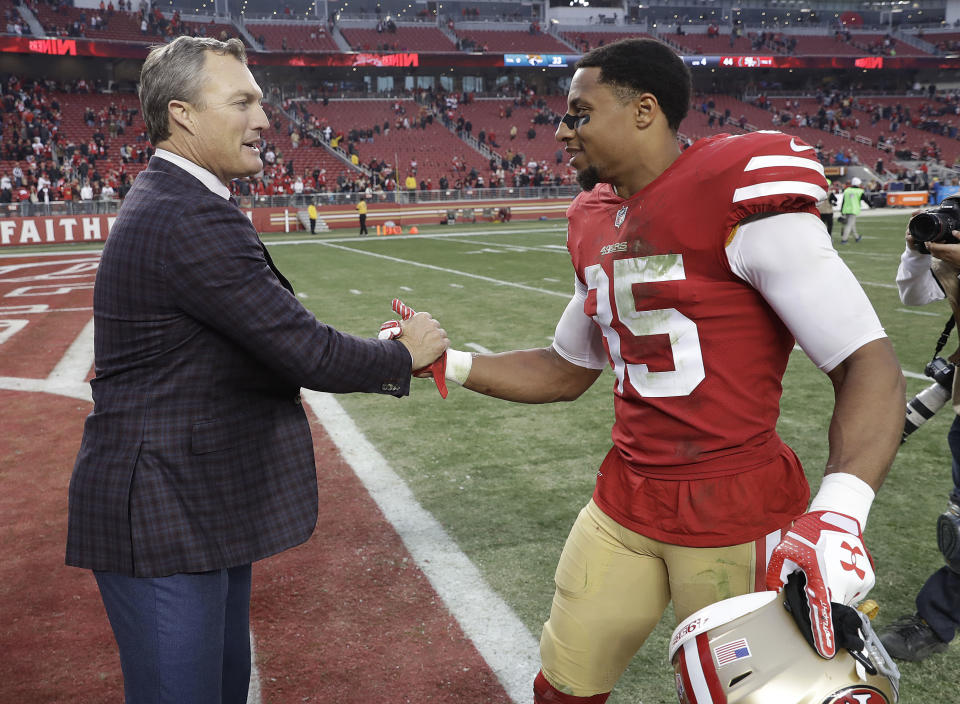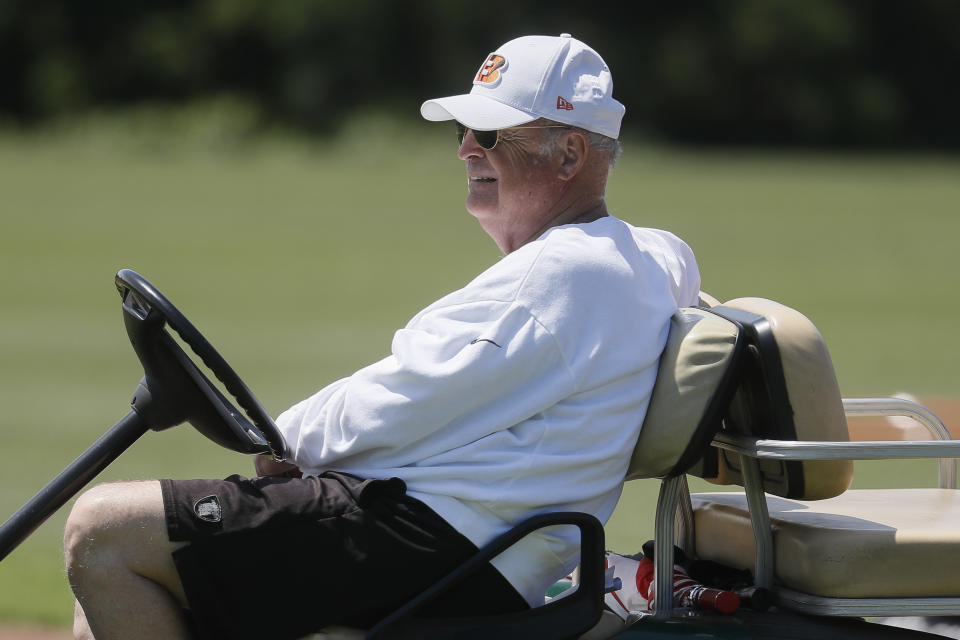Eric Reid’s Bengals visit reveals how hard-line NFL owners are treating protests
Dallas Cowboys owner Jerry Jones has denounced it. The Houston Texans’ Bob McNair has condemned it. Now Cincinnati Bengals owner Mike Brown has made it a central part of his team’s free-agent interview process.
One way or another, the NFL has formed an official – but unofficial (*wink, wink*) – policy on national anthem kneeling.
This is what the past several months have revealed: If a team owner says kneeling during the national anthem as a show of protest against police brutality and racial inequalities is not allowed, that approach is going to be sanctioned by the NFL’s league office and commissioner Roger Goodell through sheer inactivity. The league office isn’t going to push back publicly against a member of its billionaire fraternity. Not when Jones talks about taking a player off the field. Not when McNair takes it a step further verbally, wagging a vague and sweeping finger at all forms of “political” and “religious statements” on a football field. And not even when Brown – whose Bengals have historically been a red-flag warehouse – made kneeling during the anthem part of his free agency interview with safety Eric Reid.

Pro Football Talk reported Wednesday that Brown asked Reid about his past kneeling during the anthem, informing the player that he intended to prohibit that form of protest and asking for Reid’s response. A source familiar with Reid’s visit affirmed the exchange to Yahoo Sports, fueling the notion that a pre-condition of Reid’s signing would be his assurance that he would no longer kneel during the anthem.
For the league, the moment is remarkable in two ways. First, it ties the notion of employability between a team and player to kneeling, which is something the NFL has been trying to avoid, especially because of the blackballing and collusion allegation brought against the league by Reid’s close confidant, former San Francisco 49ers quarterback Colin Kaepernick. Second, it signals that while Goodell continues to paint player protests during the anthem as a topic of continued discussion, league owners have moved forward to create their own legislation to resolve any debate.
Perhaps even more eye-opening: NFL owners aren’t just creating their own rules in spite of the league office’s reticence to do so – they’re establishing their own standards in less subtle fashion than ever before. This probably explains why McNair walked into an owners’ meeting last month, openly stating that the anthem issue was not only unresolved, but that there was going to be only one outcome that satisfied him.
“Our playing field is not the place for political statements [and] not the place for religious statements,” McNair said at the Orlando meetings in March. “It’s the place for football. … I think we all need to respect our flag and respect our country. I think we’ll figure out a way to make sure that we do that.”
That wasn’t just a statement of McNair’s beliefs. It was a message to Goodell, to players, to the fan base – and maybe most of all, to other owners who feel the way McNair does. That this issue isn’t “fixed” or going away. That 2018 won’t be a repeat of 2017, when kneeling became the dominant storyline of the season. And that in case anyone wondered, McNair is going to speak on it when asked, regardless of the complications that may create for a league office that continues to walk a tightrope between outspoken players and owners.
Surely, Brown must have heard what McNair said. If not in the hallways in Orlando, then certainly in the private sessions where team owners have been hammering away at an issue that has clearly divided their club of elites. Given the inflammatory nature of the issue – and the fact that Reid and Kaepernick remain as close as ever – Brown had to know that if he waded into the protest issue with Reid, the content of that discussion would eventually get out.
Why do it? It’s simple. A particular set of NFL owners aren’t going to let Goodell and the league office control the narrative on the issue anymore. They’re not going to rein themselves in for an executive branch that hasn’t responded with urgency to something they see as a significant problem for the product they’re selling. If Goodell isn’t going to figure out a resolution, the segment of owners who insist on the banning of kneeling during the anthem is going to force the issue by handling it on their own.

Just like Jones. Just like McNair. And just like Brown.
The end result of this is expected to be a hardened rule in May, when owners have agreed to meet to meaningfully discuss the form of protest. One of two things is going to happen at that meeting: Either the NFL is going to create a rule change to make kneeling or forms of protest impossible, or it’s going to officially agree to get out of the way permanently.
The former would likely involve the past practice of keeping players off the field until after the anthem. The latter would likely be some kind of agreement with the league office that anthem rules are the responsibility of the clubs, who would be empowered to take retribution upon players who didn’t abide by franchise standards.
Neither is a palatable outcome for Goodell, whose actions have repeatedly suggested he sees only one painless outcome: Working with players until every last one decides on his own that there’s no need to kneel during the national anthem. In that world, the league has done no wrong in the eyes of fans. In that world, the players and their league have found a harmony both on and off the field that suits everyone. And in that world, the owners aren’t split into fragments, injecting yet another layer of moral and social judgment into their roster-building equations.
Unfortunately for Goodell, that world doesn’t exist. The owners are showing it with actions that are speaking louder than anything the commissioner has said to date. One way or another, a national anthem rule is going to exist in the NFL – even if 32 owners have to make up 32 different standards.
Official or not, that is what is happening right now.
More from Yahoo Sports:
• NL West rivalry explodes with massive, ugly brawl
• U.S. player in Korea banned for being too tall
• How $0 tickets could fix MLB’s attendance problem
• Questions for Reid make NFL owner look like hypocrite

